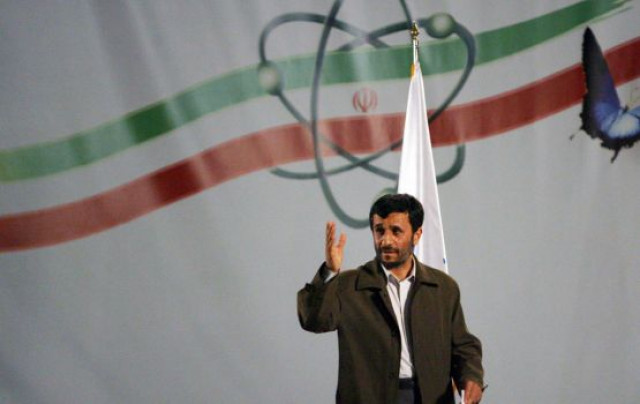Iran has launched a four day military exercise to show its strength in the wake of rising tensions with the international community and possible military action against them. Getting into gear, their Revolutionary Guards as well as their ground troops and air defenses, Iran is ready for anything.
Coinciding with the show of strength is a two day UN inspectors’ visit to Iran, the second visit this month. Led by Herman Nackaerts, the team hopes to achieve access to Parchin military base, as well as talk to question Iran’s nuclear scientist. The inspectors, however, will not be visiting any nuclear facility. So why the two day visit? A gesture towards compromise perhaps? With a side of guttural military strength?
Whether or not this recent report on Iran’s military exercise is a show of strength or preparation for impending war is not clear, but it does not help tensions as statements from both Eastern and Western media sources conflicted this entire week.
To understand everything that has happened in the last few days, we need to start in chronological order from the moment Iran successfully used their own nuclear fuel in a reactor for the first time on February 15, 2012.
Important to note, is that during this time, Iran replied to a letter Catherine Ashton, the European Union foreign policy chief wrote in October 2011, to reestablish its nuclear program discussions with the international community. However, needless to say, she has yet to write back.
So, the nuclear milestone may have been celebrated in Iran, but was detested by the international community. This would trigger some global waves.
The next thing we know is there are reports that Iran had decided to counter the EU’s oil embargo by threatening to cut off oil exports to the Netherlands, Greece, Portugal, France, Italy, and Spain. The move created quite a stir as the price of crude oil increased since the oil embargo on Iran for EU countries was set to be in effect by July 1, 2012.
Iran, however, denied all reports saying they were merely thinking of filling their now empty EU slots to other customers if the EU and the United States continued to sanction their oil imports.
The next day Dawn and the Arab News reported that Iran wanted to continue dialogue with the international community. Nuclear talks with Iran had disintegrated in January of 2011 previously.
Although many countries were weary to respond on the matter, Foreign Minister of France, Alain Juppe, was open to the idea of discussion. British officials wanted to properly analyse the letter to establish whether or not Iran was seriously interested in positive dialogue over its nuclear program. The United States remained skeptical, noting the call to talk suspicious and only for the purpose of buying time. However, Hillary Clinton, Secretary of State, said that the letter was something they had been waiting for. And so, was a step in the right direction.
And with that said, the United States then pushed banks to stop dealing with Iran. According to the Arab News, SWIFT, a Belgium based bank was pressured to eliminate Iranian banks from its network. The move has been seen as a way to cut off funding for Iran’s nuclear program.
SWIFT, countering the pressure, said they were not the only company to have to break ties with Iran, calling on telecommunication operators and providers to comply with the sanctions as well. Belgium felt singled out as SWIFT was called out to stop dealing with Iranian banks, however, other banks have been asked by the United States to do the same.
European countries, at the same time, attempted to pay no attention to Iran’s threat of stopping oil exportation to certain EU members. Europe took the statement as a bullying tactic and said they would stay committed to the task of prohibiting Iran’s nuclear program.
By Saturday, William Hague, Britain’s foreign secretary, got involved. While headlines in the Arab world read the interview as a warning to Israel by Hague, headlines in the UK hinted at a cold war erupting in the Middle East if Iran were to acquire nuclear weapons.
Expressing the importance of negotiations, Hague stressed that diplomacy had to be given a chance before any action was to take place. He said that any premature action could cause a cold war in the region. He also added that the UK was not in favor of military action in Iran, but they would not rule it out.
Hague continued on in his interview to claim that if Iran were to obtain nuclear weapons, then other nations across the Middle East would want to develop nuclear weapons as well. The horror!
William Hague took a cautious stance without being a push over, the same stance the United States has stayed true to, however, ever present rumors in and around Washington have doomed Iranian sanctions to fail. In a tough position, the United States is willing to give Iran time; however, do not feel that Iran understands the importance the ever growing tension and the impact not talking could have on the world.
And while openness to talk from the Iranian side was seen as a positive note, oil imports to France and Britain were then ceased by Iran. Iranian officials said that the oil that was supposed to go to companies in these countries was now going elsewhere.
The decision to cut off oil to France and Britain, however, was not seen as too problematic by the international community. However, the implications the action has on other countries such as Italy, Greece and Spain is worrisome, as they rely on Iran’s inexpensive oil.
The same day, General Martin Dempsey, US Chairman of the Joint Chiefs of Staff stressed that sanctions on Iran had to be given a chance before military action would be considered. Stating that action against Iran would be premature, he mentioned that international cooperation was working. Whether or not General Dempsey’s statement is in line with the United State’s stance on Iran, the statement was loud and clear, sending out a very public ‘not yet’ message to countries looking to use action against Iran sooner rather than later.
Now while China has always called on the international community and Iran to talk it out, China took a stand against Iran. After vetoing a resolution on Syria, China decided to speak out against Iran’s decision to stop oil exports to British and French companies (Shell and Total). China, a country that holds great power when it comes to Iran, as it buys around 20 percent of Iran’s oil exports, has always called for diplomacy on this matter and says any use of premature action would spiral out of control, creating more problems in the region.
While Iran has been defiant that the sanctions will not hurt them economically, within the first week of the oil embargo, Iran’s currency value fell 12%, however, Iran said it was not due to the sanctions. While a few EU members do import oil from Iran, Iran’s largest importers are in Asia, like China, India, South Korea, Japan, etc.
And the constant threat of the closure of the Strait of Hormuz by Iran is always looming over the international community’s head. Closure of the strait can see a rise in oil prices, as one-fifth of the world’s oil passes through the Strait.
And so now with the recent military exercise, who knows where this will lead the international community. According to the Guardian, Israel’s deputy prime minister Meridor said that Iran’s reaction to sanctions was a signal that there was hysteria in the country, implying that sanctions were having an effect on the Iranian economy. While there was hysteria, Meridor fell short of saying the tension was over, as Tehran continued on with its nuclear program. Signing off hopefully, Meridor said that sanctions could be successful in quelling the war hysteria with Iran.
Despite conflicting reports all week, one thing is clear. The world cannot handle another Afghanistan or Iraq.
This article was first published here.
----------------------------------------------------------------------------------------------------------------------
[poll id="121"]
Iran, laughing in the face of nuclear disaster
Hague says if Iran gets nuclear weapons, then other Middle East nations would want to go nuclear as well. The horror!



COMMENTS
Comments are moderated and generally will be posted if they are on-topic and not abusive.
For more information, please see our Comments FAQ